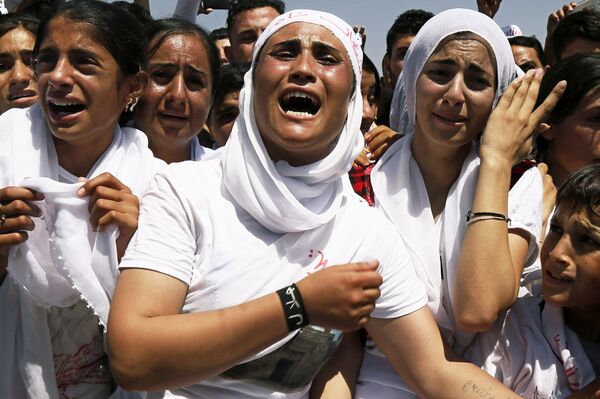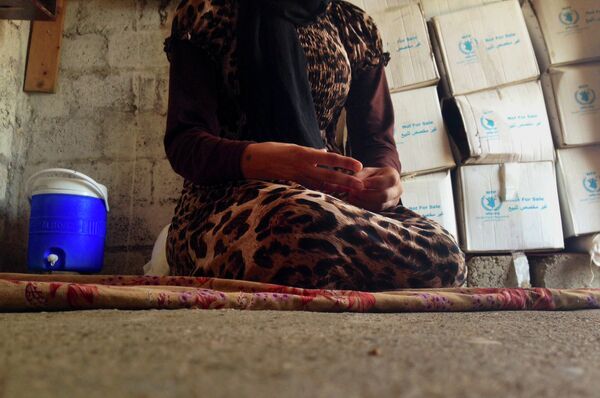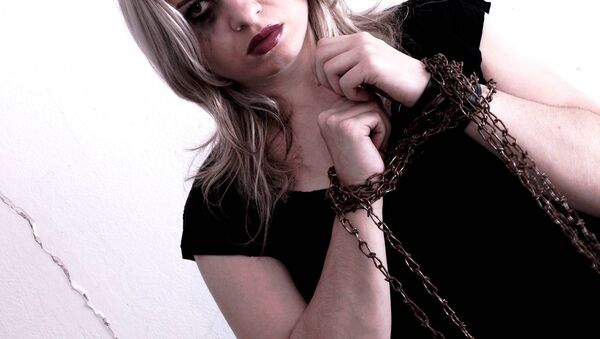"What makes her worth that price? Does she have an exceptional skill?" one of the potential buyers asks about the woman in a photo.
"No," the Daesh member replies. "Supply and demand makes her that price."

The above quotes are from a Facebook post advertising the sale of a young girl by members of Daesh. The post was removed immediately after it was published, however it only highlights the growing issue faced by online regulators, police and authorities to try and combat the issue of sex slavery.
However, experts believe that this is not just an issue faced by people in areas of conflict, where war is used as a tool to rape and enslave women and girls. This is a growing trend of discrimination against women, which is prevalent in societies and communities where misogyny and gender based violence is a part of the culture.
Aiden McQuade, Director of Anti-Slavery International, believes that countries legal systems need to be challenged in order to stop the growing trend of sexual slavery and discrimination against women and girls.
"To put it bluntly, reducing violence against women and girls, particularly in the current wars waged by the proxies of Saudi Arabia, requires their jurisprudence to be explicitly and loudly repudiated," Aiden McQuade told Sputnik.
It is widely known that in countries such as Saudi Arabia, the rape victims are the ones who are punished and prosecuted. It is this link between Saudi Arabia and Boko Haram, Daesh and other similar organizations, which has allowed the use of women as sex slaves and has caused a growing amount of discrimination against women.
Fighting Slavery in the Midst of War https://t.co/9sqSW2LbMq via @wordpressdotcom
— Aidan McQuade (@the_mcquade) December 21, 2015
It was only recently that the Council of Islamic Ideology, in Pakistan, allowed for a wife to be lightly beaten by her husband if she disobeyed him.
Pakistan: Council of Islamic Ideology recommends ‘a LIGHT BEATING’ for a wife if she defies her husband: This… https://t.co/IvhLeYjMS5
— Pamela Geller (@PamelaGeller) May 30, 2016
"The relationship between Saudi Arabia, Boko Haram and Daesh has been well established. What we so see is this attitude of misogyny prevalent in Saudi. Daesh is linked to Saudi Arabia and it has taken on a terrifying life of its own. So a lot of the issues and attitudes such as misogyny have translated into Daesh and it is manifested out into their views of women and girls," Aiden McQuade told Sputnik.
Aiden believes that the only way to solve this issue of sex slavery is to provide a robust and structured police gathering system that will help tackle and find the perpetrators. The International Criminal Court defines sex slavery as a war crime, but the only way to achieve justice is to have a good amount of evidence.

Another solution to help curb the issue of sex slavery is to ensure humanitarians are trained appropriately.
"Until now neither the humanitarian, nor development communities have in any significant way grasped the issues of slavery, trafficking or child labor. So they fail consistently to address them," Aiden McQuade told Sputnik.
"Humanitarian assessments and peace-keeping planning should include components relating to trafficking analysis.
The war against sex slavery has been an on-going one — some experts believe there is still hope, however not without hard work and a careful look at social systems that have incorporated misogyny within their regime.
"Are we winning the war against sex slavery? Probably not. First of all, what tends to occur in war is we get breakdowns in social systems and it becomes difficult. We see similar types of discrimination against women in peaceful areas and the reason is misogyny and the law that institutionalizes it. Until we get this sorted, we will not see a reduction," McQuade told Sputnik.




